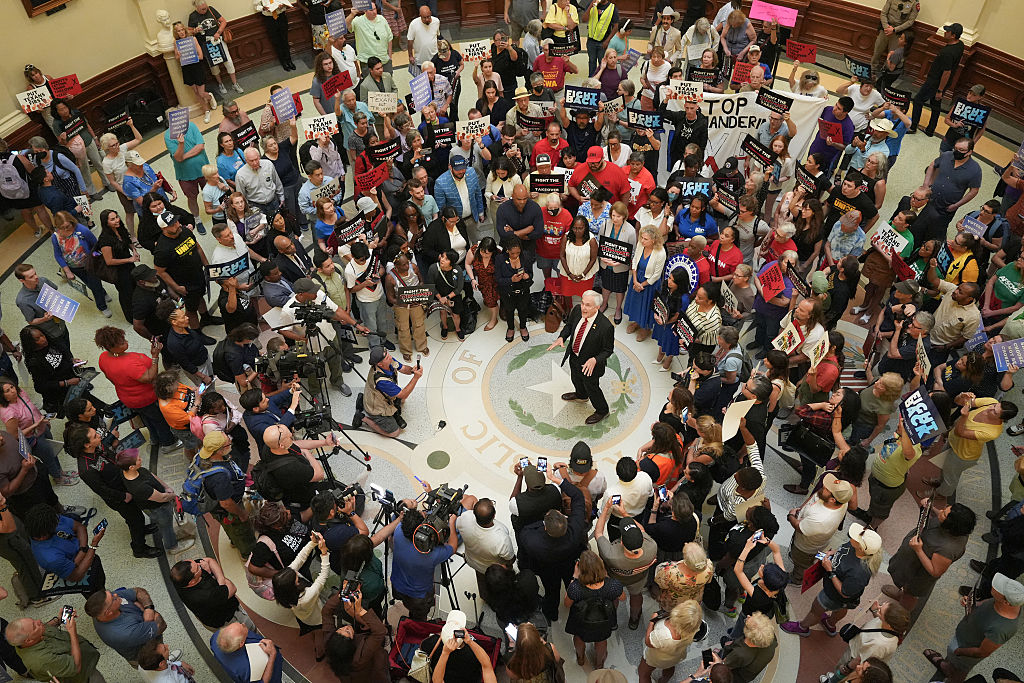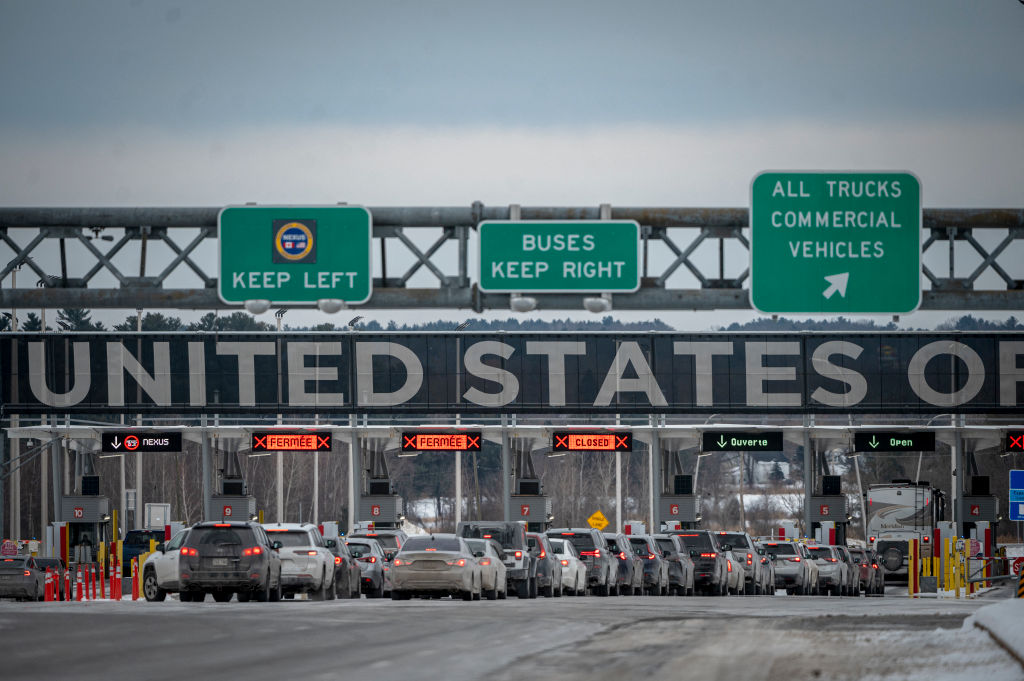[Op-Ed] Why Redistricting Is A Test Of Courage We Can’t Fail

History tells us that moments of great democratic crisis don’t ask us to recite our values louder. They ask us to risk them, to test them, and to adapt them. Today is one of those moments, and that’s why courage is the word of the hour. Look at Texas, where Republican lawmakers have passed maps mid-decade and out of cycle, designed to cement their control and rig upcoming elections because they know how unpopular they are. These maps don’t just shape the next cycle—they are a deliberate attempt to entrench minority rule and insulate those in power from the will of the people.
That kind of maneuvering is what happens when courage is absent—not just in resisting authoritarian tactics, but in rethinking our own strategies. And yet, when most people talk about courage today, they mean something far different.
Everyone demands courage. Every day, I open social media and see calls for it—courage to speak up, to make statements, to post positions of moral high ground, and to perform courage for everyone watching.
But more and more, I think we are missing what courage needs to mean right now. Courage is not just repeating the things we have always believed to be morally right. Courage is challenging those beliefs when the circumstances in which we built them have completely changed.
Because here is the truth:
The high ground doesn’t win.
The high ground doesn’t protect.
The high ground doesn’t persuade.
History gives us the receipts. During Reconstruction, Black political power expanded under the promise of the 13th, 14th, and 15th Amendments. But while white supremacists organized through violence and terror, too many leaders clung to the moral high ground without building the machinery of protection. The result was the collapse of Reconstruction, the rise of Jim Crow, and the ceding of generations of ground. High ground without power paved the way for legalized segregation.
We are standing in another one of those moments. As a civil rights attorney with almost two decades of experience in this field, I have long believed that partisan gerrymandering—and gerrymandering generally—is bad. It dilutes the voting power of Black voters, skews election outcomes, and makes our democracy less representative. That’s the moral high ground.
But I also live in reality. Conservatives have been gerrymandering districts for nearly half a century, and now they’re bending over backwards to tilt the balance of power at the request of an authoritarian regime. Meanwhile, the other side has mostly clung to principle, passing “model” reforms in mostly non-conservative places while ceding ground on the mapping of power. The result? The convergence of gerrymandered districts, the elimination of pre-clearance, voter suppression laws, the capture of the judiciary, the dismantling of the DOJ’s Civil Rights Division, and aggressive state-level redistricting under Republican trifectas. Together, these forces create the perfect storm for a neo-segregationist ethno-state being imposed on us all.
We must be clear: redistricting power lies squarely within state legislatures. That means the danger is twofold. On the federal side, redrawing congressional maps can warp representation in Washington for a generation or more, especially given this Administration’s desire to rig the decennial census. On the state side, failing to contest gerrymandering means conceding maps that lock in single-party trifectas—governor, house, and senate—that can churn out wave after wave of big, ugly bills attacking our freedoms. Our freedom to vote, our freedom to make decisions about our bodies, and our freedom to live freely without discrimination. To ignore either level is to leave whole communities at the mercy of entrenched minority rule. And history shows us that Black communities are always the first targets—facing the earliest, deepest, and most enduring harms when representation is stripped away.
Every time we refuse to contest power on the terrain where it is being fought, we hand the opposition not just maps, but legislatures. And when legislatures are lost, trifectas follow. And with trifectas come the bills that transform neo-segregationist ideology into law—and strip away the protections our communities depend on. The danger is not just one congressional map. The danger is that whole states are being locked into single-party control, paving the way for a constitutional convention within two cycles. And with that convention comes the very real possibility of stripping the constitution of the 13th, 14th and 15th Amendments—dismantling birthright citizenship, gutting equal protection, and rolling back the core guarantees of civil rights law—giving the far right exactly what they seek: the freedom to oppress. That is the cost of clinging to principle without power—watching the very foundations of our democracy rewritten while we hold fast to the high ground.
This is ideology versus reality. Ideology says gerrymandering is bad and we should reject it outright. Reality says refusing to fight fire with fire leaves us scorched. Ideology says we should cling to purity. Reality says purity without power won’t stop what is already unfolding: an administration openly threatening to send Medicaid recipients to “work in the fields,” dismantling antidiscrimination protections, and pushing toward a national “white primary” through gerrymandering and voter suppression.
So the question is not whether partisan gerrymandering is bad—we know it is. The question is whether we will have the courage to challenge even our deepest-held beliefs in order to meet the moment. Because what is at stake is not just the high ground. What is at stake is the very ground we stand on—our democracy itself.
That’s why the letter delivered by Color Of Change and a coalition of next-generation civil rights and democracy organizations is so urgent. We represent millions of voters and are demanding that governors and legislative leaders in fifteen states immediately begin redistricting ahead of the 2026 cycle. Courage today must mean reimagining our strategies, even when it forces us to confront what feels uncomfortable, and using every lawful tool at our disposal to ensure voters cannot be silenced by maps designed to erase our power. That’s why we must have the courage not just to stand for democracy, but to defend it with everything we have. Because if we hesitate while the other side rigs the maps, we hand them the future. —
Portia Allen-Kyle is a civil rights attorney, former Senior Advisor for Civil Rights at the US Department of Transportation, and the Interim Executive Director at Color Of Change
SEE ALSO:
California Gov. Gavin Newsom Signs Bill Launching Redistricting Effort
Texas County Cuts 100 Polling Stations, Limits Early Voting
Texas Rep. Nicole Collier Being Held Hostage At State House
Texas Democrats Will Return To State After Special Session Ends
Eric Holder Strategizes Against Gerrymandering With House Democrats
Gov. Greg Abbott Orders Arrest Of Texas Democrats
Calif. Gov. Gavin Newsom Counters Texas Redistricting Effort
Texas Gov. Greg Abbott Sues To Remove Democratic Rep In Redistricting Fight
Texas Creates 5 New House Seats In Areas Trump Won In 2024
Texas Dems Fight Redistricting Effort Through Filibusters
Texas State Dems Break Quorum To Prevent Redistricting Vote
US Senator John Cornyn, FBI Team Up To Hunt Texas Democrats
Critics Call Texas Governor’s New Congressional Map Gerrymandering
Video: Black Congressional Candidate Arrested For Protesting Against Racist Gerrymandering In Texas
Texas Appeals Court To Rule On Racist Redistricted Map
[Op-Ed] Why Redistricting Is A Test Of Courage We Can’t Fail was originally published on newsone.com














